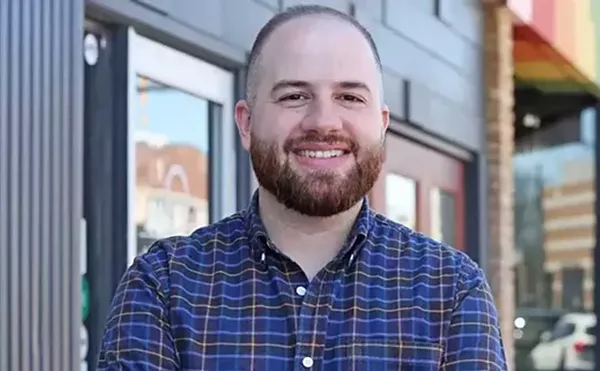
Audio By Carbonatix
[
{
"name": "GPT - Leaderboard - Inline - Content",
"component": "35519556",
"insertPoint": "5th",
"startingPoint": "3",
"requiredCountToDisplay": "3",
"maxInsertions": 100,
"adList": [
{
"adPreset": "LeaderboardInline"
}
]
}
]
It’s an oddly cool Thursday evening in Ferndale, and Wendy Case, dressed casually in a blue T-shirt, black jeans and brown clogs, is sipping wine on the enclosed back porch. Her patented blond-to-russet mane stops at her shoulders; her sharp-boned features and lithe frame are softened by graceful curves; she looks smaller in person, almost delicate, like a distant relative of the unconstrained, barrel-voiced chick who fronts the Paybacks.
Despite a life that has seen its share of party-favor addictions and attendant setbacks — and a voice that could peel rust from a Chrysler — you’d never guess that this woman is 40. Rock ’n’ roll either ages you like Keef or maintains a semblance of youth like Prince or Bryan Ferry. File Case in the latter category.
The interior of her cozy brick home — which she owns — hints at the urbane: walls the color of diluted wine and New Mexican sunrises, Asian rugs, wrought iron, antiquated pieces mixed with folk art, framed rock ’n’ roll and pop memorabilia and recurring images of Mary of Guadalupe. In the upstairs “office,” there are records from the Dictators to Queen to Dwight Twilley; Gabriel García Márquez and Hunter S. Thompson are visible in her book collection. A few of Case’s own paintings hang (a naked woman on flowers, a Brian Jones rendering). The place is ordered; beds are made, guitars rest in stands. Hardly the drunken rock band crash pad.
A grand piano belonging to Case’s beau — musician Ross Westerbur — occupies a spare bedroom. Westerbur is the definition of mild-mannered — a math teacher by profession — and is yin to Case’s yang, gentle, quiet, almost inconspicuous. He’s in the basement studio quietly working on a solo record. The two have been together for two years, and are, according to Case, very much in love.
“He’s the total opposite of me,” Case says, laughing, punctuating the comment by rattling off self-effacing epithets about herself, all loosely based on her tipple-swilling, rock ’n’ roll persona.
Or is it a persona? Live, the woman defines rock ’n’ roll. People who get it love the Paybacks. Their fan base is feverish about the quartet. In some cities, nervous kids, knees knocking, gather around Case after shows. I’ve seen it. The group’s Web message board is constantly lit with gushy Paybacks tittle-tattle. To many she is a rock star.
Yet without label support (the band’s current label, Get Hip, isn’t in the position to fund tours), the band works the crushing indie route of fetid van tours and crashing on friends’ and fans’ floors. The Paybacks can sell out the Mercury Lounge in Manhattan, kick ass in Los Angeles, Chicago and Madison, but turn around and play for three “creepy guys” at a hole in Des Moines, Iowa.
Case is grateful for any attention, though it comes with a price. She tells harrowing road stories involving lascivious Midwestern mooks, Medieval goths wielding blades, and a schtupp-hungry U.K. film critic, all incidents that arose when the band — Case plus guitarist Danny Methric, drummer Mike Latulippe and bassist John Szymanski — couldn’t afford hotel rooms.
“We’re living hand-to-mouth, living the rock ’n’ roll fantasy of a 25-year-old boy,” laughs Case. “Some of us have real adult responsibilities — houses, things that require your attention. …”
Still, Case admits that it could be harder. It’s been more than a year since she quit her six-year music scribe gig at the Detroit News, which began in the midst of the contentious newspaper strike. After her grandfather died, Case inherited enough money to set herself up comfortably, at least for a while.
After two seasons of touring, the second record just out, the band has paid its dues. Their fans are hard-won, their songs are great. But manager Rich Hanson says that the band is simply too old for a major label’s investment.
Case, though, would be an effortless sell. She knows it. “I’d be a easy character to peddle. I certainly have the stories to tell. If you’re Britney Spears, selling tits and ass, you’re going to have an expiration date. …”
And if you’re attempting to distill human emotions playing song-driven rock ’n’ roll, as are the Paybacks … tally up the odds.
There are other encumbrances: guitarist Methric (who permanently replaced Marco Delicato) fronts the Muggs, a band recently signed to local indie Times Beach, which is also home to the Hentchmen (Latulippe and Szymanski’s main band). The latter’s new record hits store shelves soon. Those bands will have busy schedules. And hometown commitments occasionally keep Szymanski from touring — and so the Paybacks added bassist Cullen Beach as an “extended member of the family.”
Case refers to herself as a perpetual child. As well she should: rock ’n’ roll requires adolescent chutzpah. For Case it’s the confluence of Peter Pan and power chords and the need, not the desire, to communicate a life of experience in three-minute blasts. It’s about creating the same glorious rock ’n’ roll rush that blew her skirt up as a tot, a little girl plucking out original ditties on a ukulele.
The Akron-born Case, the daughter of a commercial airline pilot mom and a telephone executive dad, is a guitar-wielding study of perseverance, armed with the ferocious desire to overcome hangovers from embracing life head-on. If the eyes say all, her sky-blues betray only slight weariness.
Her parents divorced early, and mom raised Case and her younger brother. Upon graduating high school in Dexter, Mich., Case went straight to her pop’s place in Northern California, intent on school. Catching the tail end of the San Francisco punk scene, she dove in headfirst.
She launched into drug addiction more from curiosity than self-pity. Think of the crusty adage that says Keith Richards ruined many guitar players by making heroin look sexy. She adored the Bowie and Iggy mythology, wanted to ingest whatever they ingested. She did — and the disease got her.
She played in punk bands (Blow Up; the Sonics-inspired Boss Hoss) and maintained a steady drug habit through college stints and jobs and bands and homelessness, spent 15 years as a functioning heroin addict. (Case graduated with a bachelor of fine arts degree from the San Francisco Art Institute in 1988.)
She’s lucky the SF years didn’t kill her; all but one of her friends from that period are now dead, including a boyfriend of six years who later died of AIDS.
A move to Ann Arbor in 1988 helped her gain perspective, but life was still lurching in fits and starts. When a succession of bands dissolved — including the Faith Healers (whose Brian Delaney helped Case get on her feet) and later, Ten High (a band Case says she inadvertently sabotaged, explaining, “it was the fear-of-success mechanism”) — she moved to Detroit in 1997, penniless.
It was a drug bust and an ensuing treatment center stint that saw Case kick dope for good. “I was already trying desperately to get clean. I never used it again. I hope that I never will. You know, I was able to do a lot of things strung out, and keep it from a lot of people.”
The Paybacks latest, Harder and Harder, a title that works on various levels — aging, carving a career in the record biz, sex — finds Case in the tough-chick warrior role with a vulnerable underside. Behind the huge guitars there’s wonderful storytelling, honest and revealing. The obvious single, “Bright Side,” is a fist-hoisting sing-along, one inspired by Westerbur (“I’m good and I’m bad news/I won’t be afraid to love you”).
The record is a throwback to the days when a kid could pick up a record and find every song listenable, where a fave would change with each listen. Song-wise the set matches the band’s exceptional debut, 2002’s Knock Loud.
Once touring for Harder is completed, the band is holing up for the winter. They’ll shop for a record deal in the spring. If, say, Methric and the Hentchmen gents aren’t on board then, Wendy says she’ll be looking for a solo deal. Besides, she says, her new songs are taking a different direction. “I’m losing my hearing! I don’t know how much more screaming I can do.”
To her, the Paybacks are family. Without them there is no Paybacks. “This band is a mutual support system based on this high level of mutual respect,” Case explains. “When John and Mike signed on for this, I knew that having them in the band meant me being respectful of the Hentchmen, a band that I’ve always loved. The loyalty is something that you can’t put a price tag on.”
If her home reveals a sense of stylish rock ’n’ roll nostalgia, so does the person. It’s not that she’s embraced the mundane; rather, she’s teaching herself to age with grace. She still rocks, still gets drunk (though she readily admits that that’s the next vice to go).
“The best stuff happens when there’s total chaos, that’s where the songs come from,” she says. “But now I’m observing instead of reacting. … I’m still trying to figure out what a grown woman in supposed to do!”
Case says she’s in rock ’n’ roll for the right reasons, that it’s not about the record sales, it’s more about how the music works in the lives of others.
“As long as I’m doing something that people find vital — I’m doing for them what the Fleshtones and the Damned did for me, I remember how impressed I was — I’ll feel like I’ll know when it’s done.”
Without skipping a beat, she adds: “I’m proud of the fact that I’m 40. It’s amazing that I’m around at all.”
The Paybacks appear at the Magic Bag (22920 Woodward Ave., Ferndale) on Friday, Aug. 20, with the Sirens and Grande Nationals. Call 248-544-3030 for more information.
Brian Smith is the Metro Times music editor. Contact him at bsmith@metrotimes.com




